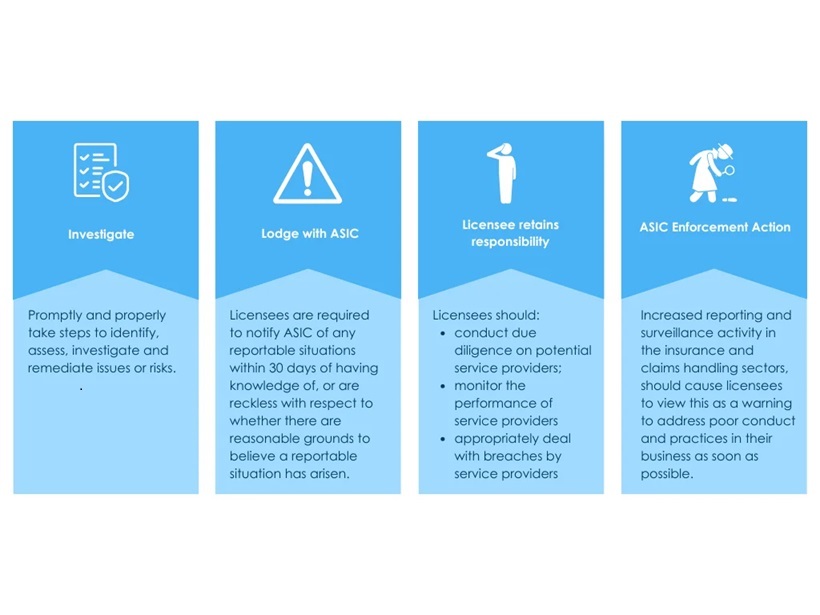- with Senior Company Executives, HR and Finance and Tax Executives
- with readers working within the Securities & Investment and Law Firm industries
Licensees authorised in relation to claims handling, insurance products or superannuation have been put on alert.
ASIC recently sued United Super Pty Ltd as Trustee of CBUS alleging that CBUS failed to:
- process death benefit and total and permanent disability ("TPD") claims made by its members within a reasonable time-frame;
- properly assess the delays encountered by the subcontractor responsible for processing the claims;
- take prompt and appropriate action when CBUS became aware of the delays; and
- properly identify the risks that its claims processing system posed to members and claimants.
As a result, ASIC claims that CBUS failed to:
- act efficiently, honestly and fairly in the handling of its members' claims for death benefit payments and TPD insurance payments (sections 912A(1)(a) and 912A(1)(5A) of the Corporations Act;
- lodge a reportable situation report within thirty (30) days of becoming aware of a reportable situation (section 912DAA(1) and 912DAA(7) of the Corporations Act); and
- take reasonable steps to ensure the breach report lodged was not false or misleading in a material particular (section 1308(5) of the Corporations Act).

Key Learnings
While this is an ongoing matter in the Federal Court of Australia, ASIC's decision to take legal action highlights the following:
Licensees must investigate issues in line with their breach reporting policy and risk management policy.
- reporting timeframes;
- the process to assess whether the issue or incident raised is a breach that is reportable to ASIC;
- the process to report to ASIC;
- how to conduct an investigation into an incident;
- whether the Licensee needs to notify any other parties (such as clients or legal advisers); and
- remediations or other compensation arrangements and who is responsible for determining these.
Reportable situations must be lodged within 30 days.
Licensees must ensure that timeframes are diarised and that the relevant staff members understand their responsibilities in relation to the lodgement. Lodgement of the reportable situation with ASIC should not be delayed because an investigation is not finalised or a Licensee is waiting on Board approval or advice from a legal representative.
Licensees are still responsible for complying with their obligations even if the activity is outsourced.
ASIC acknowledges that a Licensee may not be able to service all administrative and operational functions inhouse. In this case, Cbus engaged several external service providers, including AAS, for its material business activities such as administration, custodial services and investment management. While ASIC does not prevent Licensees from outsourcing material business activities, it expects Licensees to remain responsible for complying with their obligations by:
- implementing processes that will ensure that due skill and care is taken when selecting a suitable service provider;
- monitoring the ongoing performance of the service provider; and
- appropriately dealing with any actions by the service providers that breach service level agreements or the licensee's obligations.
Regulators are committed to identifying failures in claims handling practices.
Over the past year, there has been a growing number of media releases by ASIC and AFCA about failures in claims handling practices, particularly relating to death benefits and TPD claims. In May 2024, ASIC published an interim report, stating its intention to review industry practices and laws and warned superannuation trustees to consider whether their arrangements for dealing with death benefits and TPD claims are adequate. In mid-2024, AFCA's 2023-24 Annual Review Report highlighted that delays in claim handling was cited as the number one issue in all complaints relating to the insurance sector. While ASIC is currently conducting a surveillance on death benefits and TPD claims handling, the increasing level of activity in the insurance and claims handling sectors by regulators should be viewed as a warning for Licensees to address poor conduct and practices as soon as possible.
Further Reading
- AFCA Annual Review 2023-2024
- ASIC Corporate Plan
- ASIC sues Cbus alleging systemic claims handling failures (Media Release)
- ASIC's interim report on improving superannuation member services (Media Release)
- ASIC writes to superannuation trustees to drive improvement to death benefit claims handling (Media Release)
- Breach Reporting Policy Template (AFSL)
- Breach Reporting Policy Template (ACL)
The content of this article is intended to provide a general guide to the subject matter. Specialist advice should be sought about your specific circumstances.

